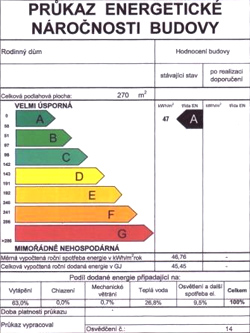
The law introducing energy labels has elicited mixed reactions
 |
Today's vote by the deputies was welcomed by the initiative Chance for Buildings, which brings together 180 companies in the field of energy-efficient construction. "The construction sector employs about 260,000 people and has the best growth potential for the Czech economy. The Chamber of Deputies saved it from uncertainty by overruling the presidential veto," said initiative coordinator Petr Holub.
President Klaus vetoed the amendment to the Energy Management Act because, in his opinion, it imposes a number of legally enforceable obligations based on unclear terminology. He was also joined by the general director of the development company Ekospol, Evžen Korec. "The amendment to the law completely misses its mark. You cannot read the specific energy costs of a particular apartment or house with precision down to a hundred crowns from any energy label; you will still need actual invoices for consumed energy," believes the head of Ekospol.
At least at the beginning, labels may cause confusion among people because the only information they care about when considering purchasing a property is how much they will pay monthly for energy, thinks the executive director of the RE/MAX real estate network, Hanuš Němeček. At the same time, he does not rule out that the introduction of labels will increase the marketability of properties with better ratings. The construction company Skanska has unequivocally backed the new standard.
In any case, the amendment signifies a fundamental change for the domestic real estate market, said lawyer Martin Bohuslav from the company Ambruz & Dark/Deloitte Legal. The same opinion is held by real estate inspection expert Ctibor Hůlka from the Nemopas project of the company Dekprojekt. "The amendment to the law will create an immediate demand in the market for 30,000 to 40,000 certificates annually, while currently it reaches about 8,000 to 12,000 per year," he told CTK. According to Hůlka, the price of certificates could temporarily double. Currently, people pay around 3,000 to 6,000 crowns for an energy certificate. "Then, probably due to the increase in the number of experts who will offer energy assessments, the price will decrease again," added the expert.
The initiative Chance for Buildings considers it crucial how the government approaches the entire issue. "The Ministry of Industry must ensure that the State Energy Inspection has sufficient capacity and a well-developed methodology for evaluating certificates. It would be a pity if the necessary matter were hindered by poor work from the government," said Holub.
The English translation is powered by AI tool. Switch to Czech to view the original text source.
0 comments
add comment
Related articles
0
24.05.2015 | Homeowners will have to pay extra for new energy certificates
1
24.01.2015 | <!DOCTYPE html>
<html lang="en">
<head>
<meta charset="UTF-8">
<meta name="viewport" content="width=device-width, initial-scale=1.0">
<title>Translation</title>
</head>
<body>
<p>Apartment buildings without an energy performance certificate risk fines in the hundreds of thousands.</p>
</body>
</html>
0
16.04.2013 | Administrative matters regarding energy labels could be simpler
1
05.03.2013 | Interest in energy labels is minimal; buyers do not require them
2
04.02.2013 | Association: Energy labels for older buildings are unnecessary
0
24.01.2013 | The ministry is ready to regulate the prices of energy labels
0
21.01.2013 | The state will pay millions for energy labels on its buildings
0
11.09.2012 | EP has approved a regulation that will force states to save energy
45
09.08.2012 | Klaus vetoed the amendment that introduces energy labels for buildings












